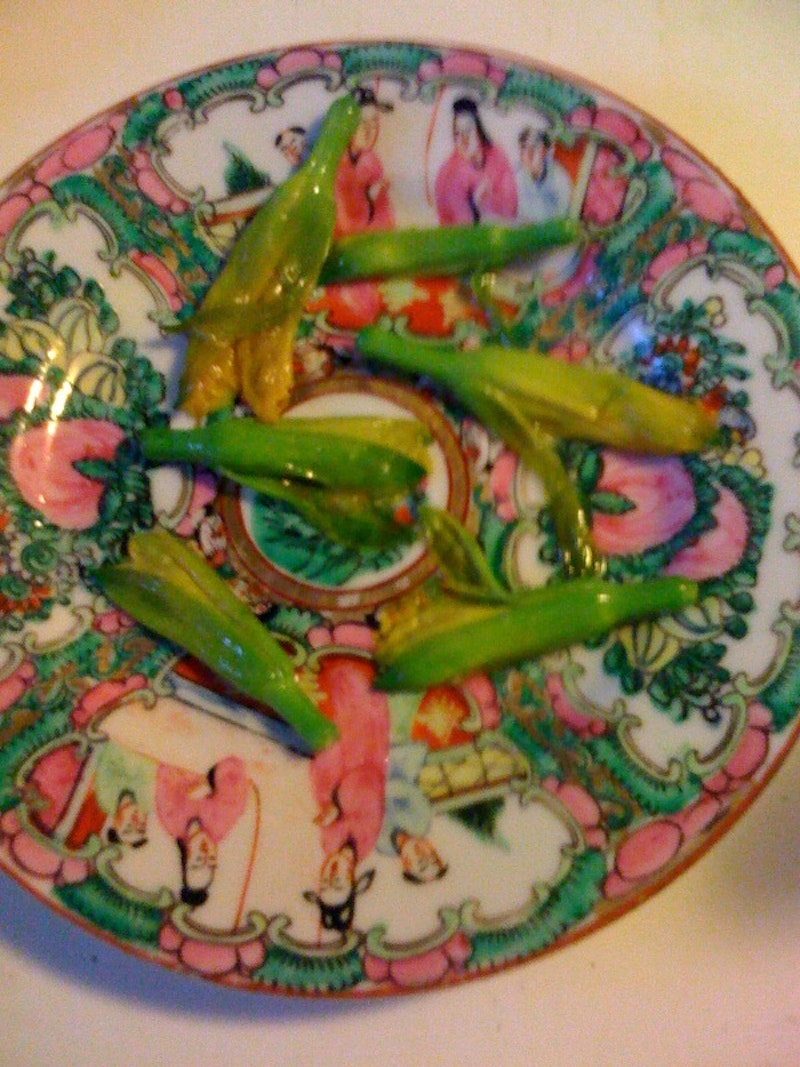June is upon us and more fruits and vegetables are coming into season in Maryland. This is what you’ll start seeing at the farmer’s market this month according to the official boards: Asparagus, Beets, Broccoli, Cabbage, Carrots, Chard, Corn, Fava Beans, Garlic Scapes, Green Onions, Kale, Lettuce, Nettles, Pea Greens, Peas, Radishes, Rhubarb, Spinach, Strawberries and Zucchini Blossoms.
Here, according to a chart in The Foragers Harvest by Samuel Thayer, is what you can find to successfully forage this June: Ostrich Fern Fiddle Heads; Cattail Leaf Bases, Spikes and Rhizomes; Wapato Greens; Wild Leek Bulbs; Smilax Shoots; Stinging Nettle Greens; Wood Nettle Greens; Sheep Sorrel Greens; Goosefoot Greens; Swamp Saxifrage Stalk; Hopniss Tuber; Sumac Shoot; Basswood Greens; Evening Primrose Greens; Common Milkweed Shoots; Virginia Waterleaf Stalks; Burdock Root, Petiole and Stalk; Thistle Root, Petiole and Stalk. Doesn't that sound so much more exciting?
I have Clare to thank for that book, as well as Euell Gibbons' authoritative Stalking the Wild Asparagus, a book I love for its line drawings and gentle, anecdotal style. She sent them to me when she was fascinated by survival literature, and urged me to read them and keep them with me in the event of war/natural disaster/zombie apocalypse. I looked through them, and kept them alternately on my bedside table and in the bathroom for sporadic reading, but never concentrated on them because I live in Baltimore City, and the idea of foraging for nettles or sheep sorrel in the cracks of the sidewalks in Hampden, or even in Wyman Park, feels very wrong.
I don't know how many heavy metals there are in our urban "soil," or what effects, if any, can occur from eating food grown in it and I don't want to find out. It's why I grow edibles in containers. But I got an e-mail from a friend informing me that some serviceberries in Remington are nearly ripe and I thought it was time to take the plunge, and go foraging.
Among my friends I know people who forage—who pick blackberries growing wild along bike paths and gather wild leek. I had a friend who spent a summer gathering young dandelions and putting them in her freezer until she had enough for dandelion wine. I know people who gather crabapples for jelly, and steal fruit from peoples' yards but I've never been so bold. I figured it was time for a trip up to Robert E Lee to look around and find some kind of wild greens to gather for supper, but today when I was walking to the Giant in the Rotunda I passed the Keswick Nursing Home, which has a nice little garden plot in front with a profusion of day lilies.
Something burbled up from the recesses of my brain: "I think Euell said you can eat the buds." I continued to the Giant and bought, among other things, a box of ziplock bags. On my way home I casually pulled one out, stopped in front of the garden plot and furtively pinched off a dozen or so of the buds. I didn't remember which stage he said they were best to eat, so I gathered ones that looked immature and others that were just beginning to open, popped them in my zip-lock and wandered home, whistling innocently.
Along my six-block walk I came across four more patches of day lilies. Upon reference, Stalking the Wild Asparagus confirmed that the buds, flowers, and even the day-old withered flowers are great foodstuffs, widely used in Asian cuisine. They're great added late in soups and stews, providing natural thickening similar to okra. He provided a sample Asian recipe, basically a stir-fry with pork and day lily buds, but I opted for the simplest preparation.
After washing them I blanched them in salt water for a minute or so.

Then I tossed them in a skillet with butter and salt:

And finally, ate them plain and hot.

The verdict is in: Delicious. They have a mild, lettuce-y flavor and a nice texture. I will eat them again, and if foraging is like this, I'm going to make it a routine.

